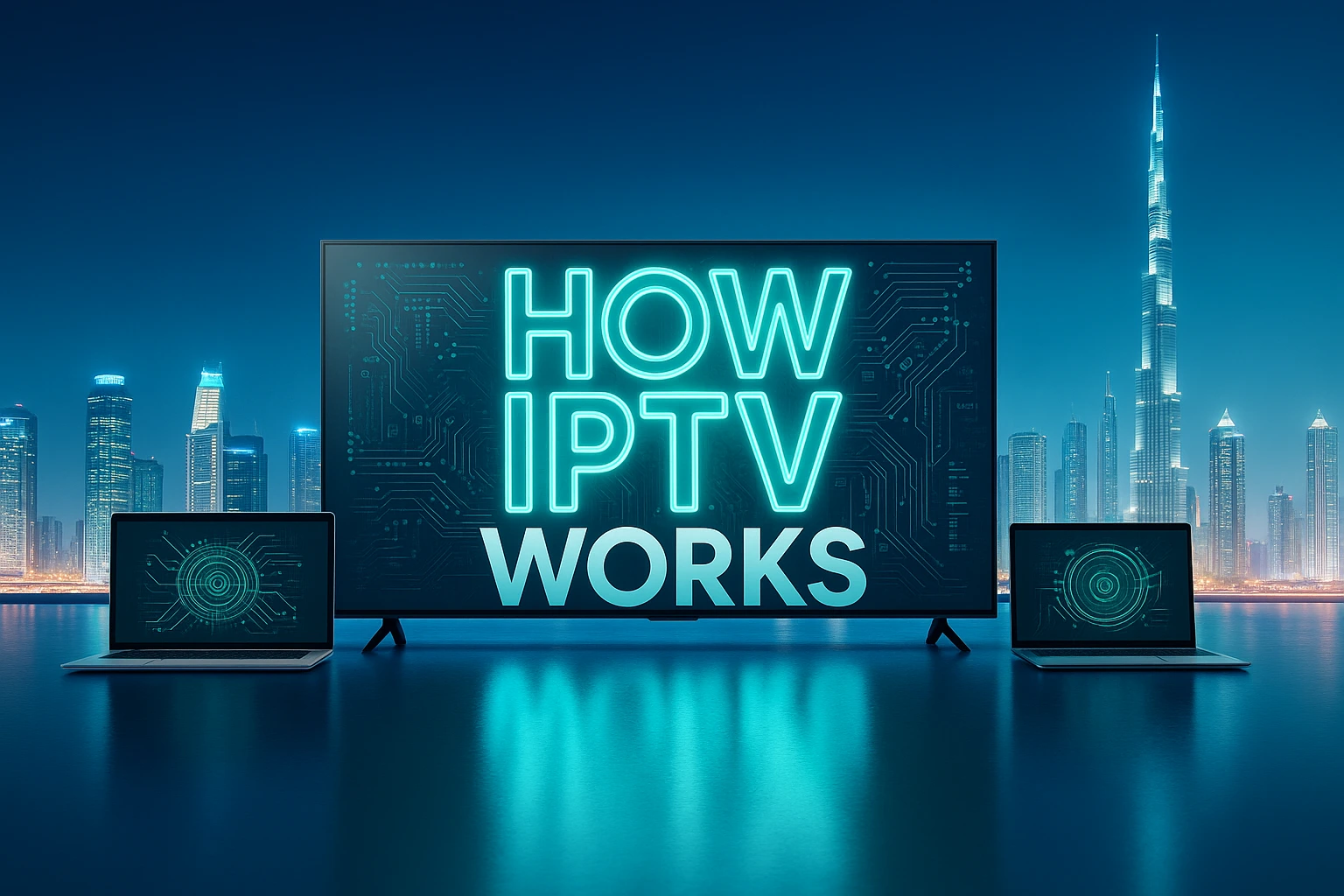Blog
What is IPTV and How Does It Work in Dubai?

- Bandwidth Requirements Streaming HD or 4K content consumes significant data. A stable internet connection with good speed is necessary for smooth playback.
- Privacy and Security Concerns Not all Internet Protocol Television services are legitimate. Using unverified providers can expose users to data theft or malware.
Legal Aspects of IPTV
Legitimate IPTV Services: ESMA-approved IPTV providers in Dubai comply with regulations and ensure secure, high-quality streaming with proper licenses.
Grey Market Operations: Some IPTV services operate without licenses. Though often cheaper, these may offer poor video quality and legal risk.
IPTV’s Potential Impact
On Conventional TV Solutions: IPTV is gradually replacing traditional TV services due to its flexibility, wider content range, and user control.
On Media Consumption Trends: As more users shift toward on-demand, mobile-friendly streaming, IPTV is shaping how content is accessed — anytime, anywhere.
- Latency Issues Due to dependency on internet quality, users may experience buffering or lag, especially with real-time services.
- Bandwidth Requirements Streaming HD or 4K content consumes significant data. A stable internet connection with good speed is necessary for smooth playback.
- Privacy and Security Concerns Not all Internet Protocol Television services are legitimate. Using unverified providers can expose users to data theft or malware.
Legal Aspects of IPTV
Legitimate IPTV Services: ESMA-approved IPTV providers in Dubai comply with regulations and ensure secure, high-quality streaming with proper licenses.
Grey Market Operations: Some IPTV services operate without licenses. Though often cheaper, these may offer poor video quality and legal risk.
IPTV’s Potential Impact
On Conventional TV Solutions: IPTV is gradually replacing traditional TV services due to its flexibility, wider content range, and user control.
On Media Consumption Trends: As more users shift toward on-demand, mobile-friendly streaming, IPTV is shaping how content is accessed — anytime, anywhere.
- Customization Options Users can curate their favorite content list, subscribe to specific genres, and manage profiles based on viewing habits.
Challenges of IPTV
- Latency Issues Due to dependency on internet quality, users may experience buffering or lag, especially with real-time services.
- Bandwidth Requirements Streaming HD or 4K content consumes significant data. A stable internet connection with good speed is necessary for smooth playback.
- Privacy and Security Concerns Not all Internet Protocol Television services are legitimate. Using unverified providers can expose users to data theft or malware.
Legal Aspects of IPTV
Legitimate IPTV Services: ESMA-approved IPTV providers in Dubai comply with regulations and ensure secure, high-quality streaming with proper licenses.
Grey Market Operations: Some IPTV services operate without licenses. Though often cheaper, these may offer poor video quality and legal risk.
IPTV’s Potential Impact
On Conventional TV Solutions: IPTV is gradually replacing traditional TV services due to its flexibility, wider content range, and user control.
On Media Consumption Trends: As more users shift toward on-demand, mobile-friendly streaming, IPTV is shaping how content is accessed — anytime, anywhere.
- High-Quality Streaming With a reliable broadband internet connection, Internet Protocol Television offers HD and 4K content, delivering better video quality than traditional TV.
- Customization Options Users can curate their favorite content list, subscribe to specific genres, and manage profiles based on viewing habits.
Challenges of IPTV
- Latency Issues Due to dependency on internet quality, users may experience buffering or lag, especially with real-time services.
- Bandwidth Requirements Streaming HD or 4K content consumes significant data. A stable internet connection with good speed is necessary for smooth playback.
- Privacy and Security Concerns Not all Internet Protocol Television services are legitimate. Using unverified providers can expose users to data theft or malware.
Legal Aspects of IPTV
Legitimate IPTV Services: ESMA-approved IPTV providers in Dubai comply with regulations and ensure secure, high-quality streaming with proper licenses.
Grey Market Operations: Some IPTV services operate without licenses. Though often cheaper, these may offer poor video quality and legal risk.
IPTV’s Potential Impact
On Conventional TV Solutions: IPTV is gradually replacing traditional TV services due to its flexibility, wider content range, and user control.
On Media Consumption Trends: As more users shift toward on-demand, mobile-friendly streaming, IPTV is shaping how content is accessed — anytime, anywhere.
- Interactivity Features Internet Protocol Television supports interactive elements like selecting camera angles in sports, adding subtitles, or even live voting during shows.
- High-Quality Streaming With a reliable broadband internet connection, Internet Protocol Television offers HD and 4K content, delivering better video quality than traditional TV.
- Customization Options Users can curate their favorite content list, subscribe to specific genres, and manage profiles based on viewing habits.
Challenges of IPTV
- Latency Issues Due to dependency on internet quality, users may experience buffering or lag, especially with real-time services.
- Bandwidth Requirements Streaming HD or 4K content consumes significant data. A stable internet connection with good speed is necessary for smooth playback.
- Privacy and Security Concerns Not all Internet Protocol Television services are legitimate. Using unverified providers can expose users to data theft or malware.
Legal Aspects of IPTV
Legitimate IPTV Services: ESMA-approved IPTV providers in Dubai comply with regulations and ensure secure, high-quality streaming with proper licenses.
Grey Market Operations: Some IPTV services operate without licenses. Though often cheaper, these may offer poor video quality and legal risk.
IPTV’s Potential Impact
On Conventional TV Solutions: IPTV is gradually replacing traditional TV services due to its flexibility, wider content range, and user control.
On Media Consumption Trends: As more users shift toward on-demand, mobile-friendly streaming, IPTV is shaping how content is accessed — anytime, anywhere.
What is IPTV?
IPTV stands for Internet Protocol Television. Unlike traditional broadcasting methods that rely on satellite signals or cable, IPTV delivers TV content using internet protocol over a broadband connection. This means shows, movies, and live TV are streamed through the internet, directly to your device, offering a more flexible and interactive viewing experience.
Traditional cable or satellite TV broadcasts channels in real-time through fixed schedules. Internet Protocol Television, on the other hand, allows users to stream content on demand, pause live shows, or catch up on missed programs — features not typically offered by older systems. With Internet Protocol Television, viewers are no longer bound by a preset schedule or device.
Types of IPTV Services
- Live TV : Live TV on IPTV replicates the experience of traditional broadcasting but over an internet connection. It includes sports, news, and entertainment channels, streamed in real time through a private or public IP network.
- Video on Demand (VOD): VOD gives viewers the freedom to choose and watch content at their convenience. Popular movies, series, and documentaries are available to stream anytime from a wide content library.
- Time-Shifted Media (Catch-Up TV) : Catch-Up TV allows users to access previously aired content. If you missed a live show, you can watch it later — typically available for a set period, like 7 days after broadcast.
IPTV Architecture
- Video Server Networks: Internet Protocol Television providers maintain content libraries on video server networks. These servers store and transmit media files efficiently across high-speed internet connections to ensure smooth delivery.
- Home Network Setups: To enjoy IPTV at home, a stable internet connection and a compatible device are essential. This could be a Smart TV, IPTV set-top box, or even a mobile device connected to Wi-Fi or Ethernet.
Key Protocols in IPTV
- Real-Time Streaming Protocol (RTSP): RTSP helps in streaming content in real-time by managing the delivery of audio and video
- Hypertext Transfer Protocol (HTTP): HTTP is commonly used for on-demand content and lets users access content directly from web-based platforms.
- Internet Group Management Protocol (IGMP): IGMP supports multicast streaming, allowing Internet Protocol Television services to efficiently deliver live content to multiple users.
Advantages of IPTV
- Interactivity Features Internet Protocol Television supports interactive elements like selecting camera angles in sports, adding subtitles, or even live voting during shows.
- High-Quality Streaming With a reliable broadband internet connection, Internet Protocol Television offers HD and 4K content, delivering better video quality than traditional TV.
- Customization Options Users can curate their favorite content list, subscribe to specific genres, and manage profiles based on viewing habits.
Challenges of IPTV
- Latency Issues Due to dependency on internet quality, users may experience buffering or lag, especially with real-time services.
- Bandwidth Requirements Streaming HD or 4K content consumes significant data. A stable internet connection with good speed is necessary for smooth playback.
- Privacy and Security Concerns Not all Internet Protocol Television services are legitimate. Using unverified providers can expose users to data theft or malware.
Legal Aspects of IPTV
Legitimate IPTV Services: ESMA-approved IPTV providers in Dubai comply with regulations and ensure secure, high-quality streaming with proper licenses.
Grey Market Operations: Some IPTV services operate without licenses. Though often cheaper, these may offer poor video quality and legal risk.
IPTV’s Potential Impact
On Conventional TV Solutions: IPTV is gradually replacing traditional TV services due to its flexibility, wider content range, and user control.
On Media Consumption Trends: As more users shift toward on-demand, mobile-friendly streaming, IPTV is shaping how content is accessed — anytime, anywhere.



















